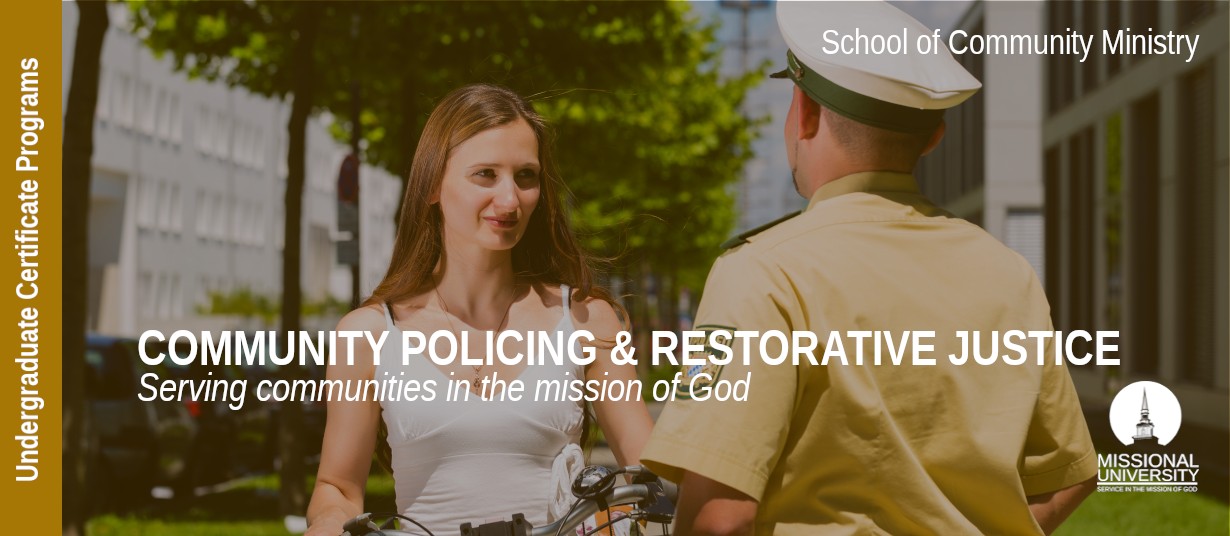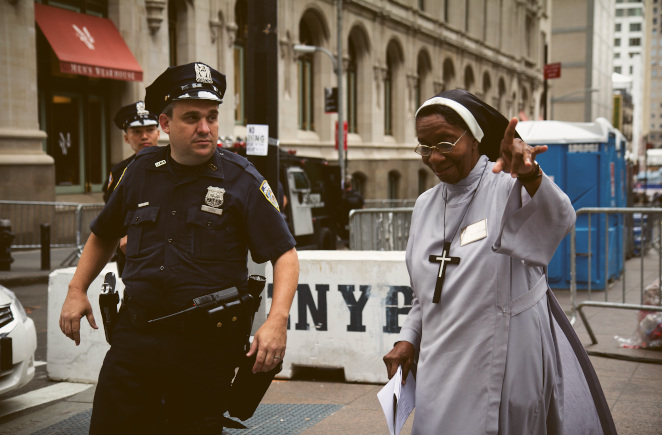
Online Undergraduate Certificate in
Community Policing & Restorative Justice
⚜ Rarely Offered in Christian Universities, Bible Colleges or Seminaries
Expand Your Missional Service Today!
REQUEST INFORMATION
Ready to learn more about the
Undergraduate Certificate in
Community Policing & Restorative Justice?
LEARN MORE NOW
The Undergraduate Certificate in Community Policing & Restorative Justice equips law enforcement and community leaders to develop interactive partnerships. By developing connections within the community, police are better informed and empowered to solve public safety problems. Rooted in a theology of restorative justice, the program teaches the nature of communities, conflict resolution and mediation skills, ethical decision-making, community policing theory and practice, and crime prevention theories.
Community policing is a philosophy that promotes organizational strategies that support the systematic use of partnerships and problem-solving techniques to proactively address the immediate conditions that give rise to public safety issues such as crime, social disorder, and fear of crime. In an era with increased tension between law enforcement and the communities they serve, community policing is an area in which missional Christians can invest in easing tensions, fostering trust and transparency, and coordinating targeted use of shared resources to serve the community.
Program Features
-
Integrated practicums allow you to gain valuable real-world experience
-
Learn from academic practitioners from around the world
-
Credits earned in this certificate program can apply to a Missional University Bachelor degree program
Course Effort
Course Length
Credits Required
Program Cost
What Will I Study?
We offer the most comprehensive approach to serving communities in the mission of God.
Examines the principles of restorative justice from a theological perspective and their application to human suffering. The biblical narrative of God’s love for the poor, widows, orphans, and foreigners will serve as the basis for study and practice. Group discussions, book reviews, research papers, and quizzes will help the student them better understand and engage in restorative justice.
Introduces students to the evolution and nature of human communities from a geographical, historical, religious, and sociological perspective. Particular attention that may be explored include community formation and change, cooperation within and between communities, and the need to address community/urban concerns.
Human tendency is to focus on the issues that divide society and community. Hence, throughout human history, local and global wars have caused the loss of millions lives, the destruction of civilization and hope. This course examines the root causes of conflict, effective methods and skills of negotiation, art of mediation, to achieve peace and stability for mutually enriching coexistence. Students will examine cultural norms and values that enhance prejudice, superiority conflict, dominance, and conflict in various cultural contexts. By sharpening cross-cultural knowledge and understanding of human beings without bias, the course provides knowledge and skill of conflict resolution.
This course will examine current issues related to ethics in the field of criminal justice. Students will become familiar with the ethical challenges that arise in the criminal justice profession. Students will become familiar with the practical issues that generate interaction between ethics and criminal justice. Students will be exposed to various theories that may provide practical application of the theories, including biblical and contemporary theories. Students will develop a better understanding of moral and ethical dilemmas confronting the criminal justice field and how these dilemmas may be resolved successfully.
This course will examine proactive community-oriented policing and problem solving (COPPS) in the context of changes in police department and communities. Students will examine the evolution of Community Policing, the relationship between law enforcement and the community, policing philosophy, implementation of COPPS, and methods to evaluate COPPS initiatives. Students will use Community Policing philosophy into a law enforcement agency not currently using a Community Policing strategy.
The study of crime prevention focuses on developing and evaluating interventions for applications in real-world settings. In addition to exploring basic concepts and theories, offers student the knowledge and skills necessary to plan, implement, evaluate, and sustain effective crime prevention intervention.
Optional Additional Courses:
This course explores the nature of communication within and among cultures. The class will also examine attitudes toward diversity that lead to stereotyping, discrimination, and prejudice, and explore ways to overcome barriers that separate people from one another.
An examination of the cause and effects of substance abuse and society. Students will learn not only how the environment plays a role in a substance abuser’s life, but also how a substance abuser influences the environment around them. Both positive and negative cause and effects will be discussed in this course.
This course is designed to create an environment for Missional students to explore various tenets of working with at risk youth from a risk and resiliency perspective. The purpose of this course is to support Missional students to critically examine their beliefs, values and feelings in relation to at risk populations (specifically at risk youth), explore and apply the Resiliency Enhancing Model, and assess possible roles for the social science professional at the micro, mezzo and macro level of intervention.
Intro to Homeland Security will provide an overview of the key operational and policy areas the United States government engages in to ensure the security of the nation. This course will provide a source of history, practical information, programs, references, and best practices so that students will be motivated to engage in actions to help make their communities safer and more secure.
When Can I Get Started?
We offer multiple start dates each year to give you flexibility in your education, life and work schedules.
JANUARY
MARCH
MAY
AUGUST
OCTOBER
A Career in Transforming Communities
Is this Your Mission?
Community Policing Advisor, Community Policing Advocate, Community Policing Coordinator, Community Service Officer, Peace Officer, Crime Prevention Specialist, Patrol Officer, Police Officer, Deputy Sheriff, Law Enforcement Officer, Patrolman, Field Training Officer, Municipal Police, Special Agent, Special Police, Community Beat Manager, Family Liaison Officer, Chief Police Officer
Request Information Now
How Much Will it Cost?
We offer tuition based upon country of residence. According to the Human Development Index, all countries around the world fall into one of four categories:
-
(Tier 1) - Very High Human Development
-
(Tier 2) High Human Development
-
(Tier 3) Medium Human Development
-
(Tier 4) Low Human Development
Our tiered global tuition makes higher education affordable for everyone world wide.

TIER COUNTRIES
100% Tuition
$295
per credit hour
3 credit course
$885

TIER COUNTRIES
80% Tuition
$236
per credit hour
3 credit course
$708

TIER COUNTRIES
60% Tuition
$177
per credit hour
3 credit course
$531

TIER COUNTRIES
40% Tuition
$118
per credit hour
3 credit course
$354
Tiered tuition based on country of origin and scholarships available. Find your country of residence here for more information.
Tuition may be further reduced by participating in the Sponsorship Program.
